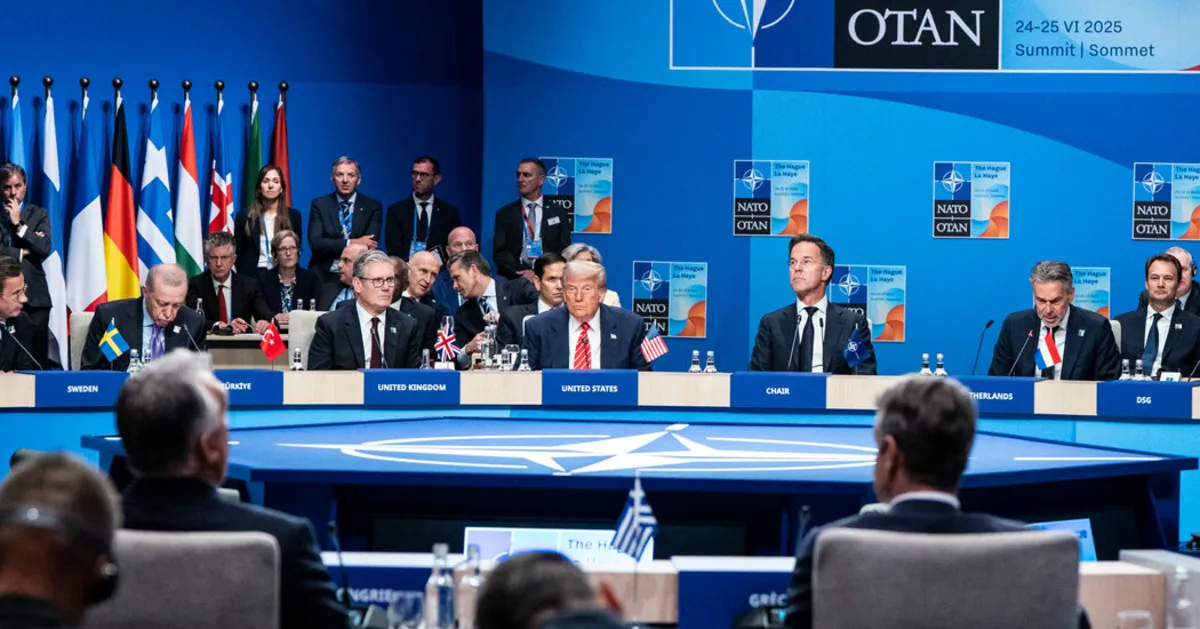
The findings of a preliminary Pentagon report have surfaced, revealing that recent military strikes against Iran may have only temporarily delayed the country’s nuclear program by a few months. This revelation is particularly damaging because it originated from within the Pentagon, the very institution responsible for executing the strikes. Former President Donald Trump had been keen to tout this military action as a significant victory, especially during a time when he was celebrating success at NATO.
In the aftermath of the strikes, Trump received a private message from NATO Secretary General Mark Rutte, who expressed gratitude for Trump’s “decisive action” in Iran. Rutte described the military strikes as “truly extraordinary,” emphasizing that such actions had not been attempted by previous leaders. This correspondence, initially intended to be private, was shared by Trump on his social media account, further amplifying its impact.
Rutte also mentioned to Trump that he was “flying into another big success in The Hague” that evening, referencing NATO’s agreement for member nations to allocate 5 percent of their gross domestic product (GDP) towards defense spending. This was a significant win for Trump, who has long urged European allies to contribute more financially to their own defense needs. The commitment from NATO allies reflects a shift in response to rising concerns about Russian aggression.
Trump’s recent actions have underscored the advanced capabilities of the U.S. military compared to other NATO forces. No other member nation possesses the military might to execute long-range strikes against fortified targets deep within Iran. However, the subtext of the NATO meeting in The Hague was clear: member nations must adapt to a new reality where they can no longer rely on Washington as the cornerstone of the alliance.
During the summit, tensions arose due to Trump’s reluctance to commit more military support to Ukraine, which has become a focal point of NATO discussions. His ongoing communications with Russian President Vladimir Putin have left allies feeling uneasy about the United States' stance on collective security.
Trump’s mood fluctuated dramatically as he navigated international relations that week. He initially expressed frustration over a ceasefire between Israel and Iran collapsing and criticized both nations for their lack of control. After a phone call with Israeli Prime Minister Benjamin Netanyahu, the cease-fire was reinstated, lifting Trump’s spirits temporarily.
However, the situation took a turn as intelligence reports began to leak, suggesting that the military strikes had not been as effective as Trump had hoped. White House Press Secretary Karoline Leavitt dismissed the findings as “flat-out wrong,” asserting they were an attempt to undermine Trump’s credibility.
Compounding these issues, Trump’s administration faced criticism for cuts to the Cybersecurity and Infrastructure Security Agency (CISA), which is pivotal in safeguarding the nation’s critical infrastructure. The FBI was recently directed to assist CISA in protecting against cyber threats, highlighting the increased risks of cyberattacks following the military actions against Iran.
Former homeland security officials have expressed concerns that the drastic cuts and shifts in focus toward immigration have left the U.S. less secure than before. As Mary Ellen Callahan, a former assistant secretary for homeland security, noted, the prioritization of immigration over counterterrorism has heightened vulnerabilities.
On a broader scale, Germany has been prompted to increase its military spending significantly, a move sparked by both Trump’s pressure and growing concerns regarding Russia. The German government has proposed a budget that would see military funding rise to at least 3.5 percent of its GDP by 2026, with the aim of meeting NATO’s 5 percent target.
This paradigm shift in Germany’s defense policy underscores the long-term implications of Trump's demands for increased defense spending among NATO members. As finance minister Lars Klingbeil stated, the investment is essential for the country's future security and viability.
The NATO summit in The Hague comes at a critical time, with Trump’s military actions against Iran stirring international debate. While a newly announced cease-fire may temporarily unite NATO members, the lingering uncertainties regarding U.S. commitment to Article 5—NATO's defense pledge—continue to create unease among allies.
As NATO leaders gather, the focus on defense spending and collective security measures will be paramount. The outcomes of this summit will have lasting repercussions on the alliance’s cohesion and its ability to address global threats effectively.
In conclusion, the recent developments within NATO and the reactions to Trump's military actions against Iran highlight the complexities of international relations in an evolving geopolitical landscape. With the U.S. military's capabilities contrasted against the backdrop of NATO's collective security framework, it is clear that member nations must navigate new challenges while seeking unity in defense commitments.